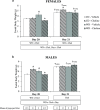Maternal choline supplementation mitigates premature foetal weight gain induced by an obesogenic diet, potentially linked to increased amniotic fluid leptin levels in rats
- PMID: 38762543
- PMCID: PMC11102553
- DOI: 10.1038/s41598-024-62229-2
Maternal choline supplementation mitigates premature foetal weight gain induced by an obesogenic diet, potentially linked to increased amniotic fluid leptin levels in rats
Abstract
Placental leptin may impact foetal development. Maternal overnutrition has been linked to increased plasma leptin levels and adverse effects on offspring, whereas choline, an essential nutrient for foetal development, has shown promise in mitigating some negative impacts of maternal obesity. Here, we investigate whether a maternal obesogenic diet alters foetal growth and leptin levels in the foetal stomach, amniotic fluid (AF), and placenta in late gestation and explore the potential modulating effects of maternal choline supplementation. Female rats were fed a control (CD) or a western diet (WD) four weeks before mating and during gestation, half of them supplemented with choline (pregnancy days 11-17). Leptin levels (in foetal stomach, AF, and placenta) and leptin gene expression (in placenta) were assessed on gestation days 20 and 21. At day 20, maternal WD feeding resulted in greater leptin levels in foetal stomach, placenta, and AF. The increased AF leptin levels were associated with a premature increase in foetal weight in both sexes. Maternal choline supplementation partially prevented these alterations, but effects differed in CD dams, causing increased AF leptin levels and greater weight in male foetuses at day 20. Maternal choline supplementation effectively mitigates premature foetal overgrowth induced by an obesogenic diet, potentially linked to increased AF leptin levels. Further research is needed to explore the sex-specific effects.
Keywords: Choline; Foetal development; Leptin; Perinatal nutrition; Sex-dependent metabolic programming.
© 2024. The Author(s).
Conflict of interest statement
The authors declare no competing interests.
Figures




Similar articles
-
Leptin Distribution in Rat Foetal and Extraembryonic Tissues in Late Gestation: A Physiological View of Amniotic Fluid Leptin.Nutrients. 2020 Aug 21;12(9):2542. doi: 10.3390/nu12092542. Nutrients. 2020. PMID: 32825787 Free PMC article.
-
Maternal Dietary Improvement or Leptin Supplementation During Suckling Mitigates the Long-Term Impact of Maternal Obesogenic Conditions on Inflammatory and Oxidative Stress Biomarkers in the Offspring of Diet-Induced Obese Rats.Int J Mol Sci. 2024 Nov 5;25(22):11876. doi: 10.3390/ijms252211876. Int J Mol Sci. 2024. PMID: 39595945 Free PMC article.
-
Maternal choline supplementation in a rat model of periconceptional alcohol exposure: Impacts on the fetus and placenta.Alcohol Clin Exp Res. 2021 Oct;45(10):2130-2146. doi: 10.1111/acer.14685. Epub 2021 Aug 18. Alcohol Clin Exp Res. 2021. PMID: 34342027
-
Maternal antenatal anxiety and amniotic fluid cortisol and testosterone: possible implications for foetal programming.J Neuroendocrinol. 2008 Apr;20(4):489-96. doi: 10.1111/j.1365-2826.2008.01659.x. Epub 2008 Feb 8. J Neuroendocrinol. 2008. PMID: 18266948 Review.
-
Placental Impact of Dietary Supplements: More Than Micronutrients.Clin Ther. 2021 Feb;43(2):226-245. doi: 10.1016/j.clinthera.2020.11.017. Epub 2020 Dec 23. Clin Ther. 2021. PMID: 33358257 Free PMC article. Review.
References
MeSH terms
Grants and funding
LinkOut - more resources
Full Text Sources
Medical

